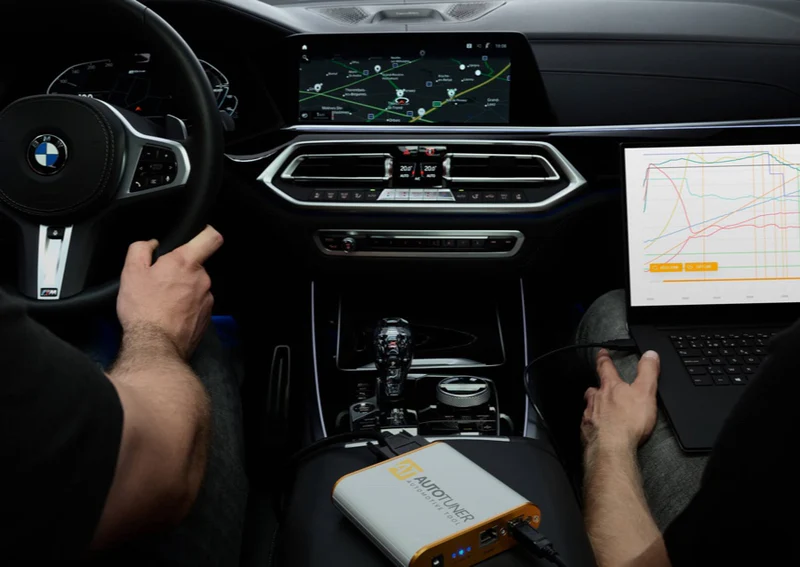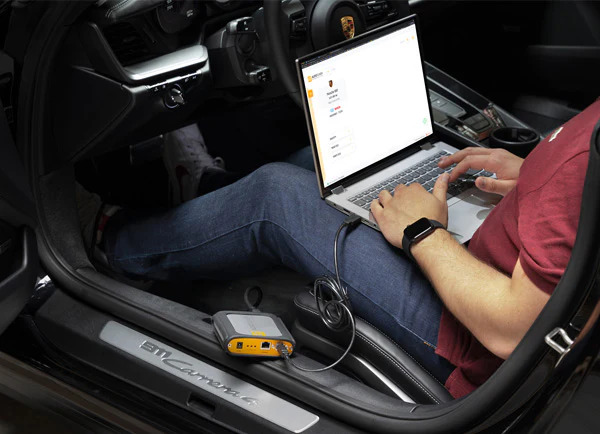The automotive industry is undergoing a seismic shift, driven by technological advancements and a growing demand for skilled technicians. Reports of auto tech shortages in the US are becoming increasingly common, raising questions about the reasons behind this phenomenon and the future of the profession. To shed light on this issue, we spoke with Helton Seixas de Paiva Lima, a seasoned professional in the automotive industry.
Helton Lima is a dedicated tuner and performance specialist representing Overspeed Chiptuning, a São Paulo-based Brazilian tuning company, in Rio de Janeiro. His expertise lies in automotive mechanics and electrical systems, making him uniquely positioned to comment on the challenges and opportunities within the auto tech landscape.
Helton’s journey into the automotive world began unconventionally. Initially pursuing Architecture and Urbanism at UFF, he was captivated by the intricate processes involved in bringing a project from conception to completion. However, his lifelong fascination with moving parts, frameworks, and technical drawings eventually steered him towards motorsports.
“I realized that my true passion wasn’t in buildings, but in engines,” Helton explains. Unsatisfied with architecture, he redirected his focus towards the world of mechanical noise, heat, and speed. He further honed his skills through specialized training with institutions like Fueltech Education, HP Academy, and MS MotorService, developing a blend of high-performance mechanics, embedded electronics, and workshop management expertise.
Helton believes that adaptability and continuous learning are crucial for professionals, driving creativity and a commitment to quality. “I strive to approach every task as if I were the end user, delivering the level of quality I would want to experience myself.”
The High Demand for Auto Techs: A Complex Equation
The rising demand for auto techs is multifaceted, driven by the increasing complexity of modern vehicles. “Today’s vehicles are more complex than ever,” Helton points out, “featuring intricate computer systems, sensors, and networking capabilities. This complexity brings the need of highly skilled technicians who can diagnose and repair these systems.”
Furthermore, the automotive industry’s transition to electric vehicles (EVs) is creating a surge in demand for technicians trained in EV systems, battery management, and charging infrastructure. As more manufacturers embrace electric mobility, the need for specialized EV technicians will only intensify.
The Challenges of a Modern Tuner
Helton’s work as a tuner and Euro car tech presents its own unique set of challenges. “Working as a tuner and Euro car tech can be pretty tough sometimes,” he admits. “For starters, the systems in these cars are super complex. You really need to know your stuff to figure out what’s going on under the hood.”
Tuning requires a deep understanding of both mechanics and software. “Tuning isn’t just about the mechanics; it’s a whole mix of understanding software and performance tweaks. You’ve got to be on top of things like fuel maps and timing, which can get pretty technical.”
The rapid pace of innovation in the automotive industry also demands constant learning. “There’s always some new model or tech coming out, so you’ve got to keep learning to stay in the loop.”
Customer expectations also play a significant role. “They often have high hopes for performance upgrades, and balancing those expectations while making sure everything is safe can be a real challenge.”
Furthermore, regulations regarding emissions and modifications can complicate the tuning process. Technical proficiency, access to the latest diagnostic tools, and effective time management are also essential for success in this demanding field.
Combating Unrealistic Expectations: The Impact of Misleading Sales Tactics
Helton highlights a significant challenge in the automotive world: sellers who peddle unrealistic dreams to car buyers. “Working in the automotive world can get a bit messy with sellers out there pushing fantasies that promise the sometimes physically impossible gains to reach,” he explains. “And then reality hits when customers bring them to us, and sometimes we end up like ‘bad guys’ or that we don’t know what we are doing.”
The pervasiveness of social media and unreliable data contributes to this problem. “They see numbers and unreliable data, but when they don’t get that kind of boost, they come to us disappointed.” The use of ineffective or unsafe modifications further complicates the issue. “Sometimes customers come in with issues that stem from those shady upgrades, and suddenly it’s a whole different ball game for us, cause sometimes we have to find things that weren’t supposed to be there.”
The belief that modified cars require minimal maintenance is another common misconception. “When folks think they’ve bought a miracle car that needs zero maintenance, it’s a recipe for awkward conversations.”
These misleading practices not only create unrealistic expectations but also increase the workload for technicians who must rectify the problems caused by questionable modifications.
Helton identifies some common deceptive practices. “The most common claim is that the car has been “fully inspected” or is in “like-new condition,” even when it may have hidden issues or hasn’t been thoroughly checked.” Exaggerating performance capabilities and downplaying the total cost of ownership are also common tactics.
AI’s Transformative Role in Auto Programming
Artificial intelligence (AI) is revolutionizing auto programming tools, offering new capabilities for diagnosis, maintenance, and data analysis. “AI is really shaking things up in the auto programming scene,” Helton notes, “making a big splash in a few cool ways.”
AI-powered diagnostic tools can quickly analyze data and identify problems by recognizing patterns. Predictive maintenance capabilities enable technicians to anticipate potential issues before they arise. Furthermore, AI can analyze vast amounts of data generated by modern vehicles, providing valuable insights into performance, driver behavior, and market trends.
The Future of Auto Tech: A Promising Outlook
Despite the challenges, Helton believes that the demand for auto technicians and programmers will remain strong in the future. “One big reason auto technicians and programmers will stay in demand is that a lot of vehicles on the road are getting older,” he explains. As cars age, they require more maintenance and repairs, ensuring a steady demand for skilled technicians.
The increasing reliance on software in modern vehicles also creates a demand for professionals with programming expertise. “Cars today are packed with software that controls everything from navigation to engine performance. This means folks with programming skills are super important for developing, updating, and fixing that software.”
The growing emphasis on sustainability and eco-friendly technologies will further drive demand for technicians knowledgeable in these areas. “Technicians who are in the know about eco-friendly practices and technologies will be key players in meeting the needs of environmentally conscious drivers.”
Ultimately, continuous learning and adaptation are essential for success in the ever-evolving automotive industry. “Those who stay on top of the latest trends and technologies will definitely be in demand.”
The auto tech shortage in the US presents both challenges and opportunities. By embracing continuous learning, adapting to new technologies, and addressing the deceptive practices that create unrealistic expectations, the automotive industry can ensure a strong and thriving future for auto technicians and programmers.







































